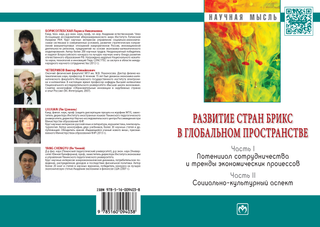?
Глава 2. Экономические показатели стран БРИКС в среде больших экономик. Разделы 2.5. Глава 3. Инновационная деятельность стран БРИКС в контексте глобального развития. Раздел 3.1
In Section 2.5 of monograph “The development of the BRICS countries in the global space: the potential of cooperation and trends of economic processes”, the object of study are the national banking system of the BRIC countries in the period 2007-2009, a very stressful time for the entire world banking community. Annual reports of central banks selected indicators of the World Bank report were used. The section 3.1 of monograph “The development of the BRICS countries in the global space: the potential of cooperation and trends of economic processes” discusses issues of innovative development of the BRICS in the global space. The factors of innovation sphere BRICS and performances of these countries in international rankings of competitiveness and innovation are considered.
In book
